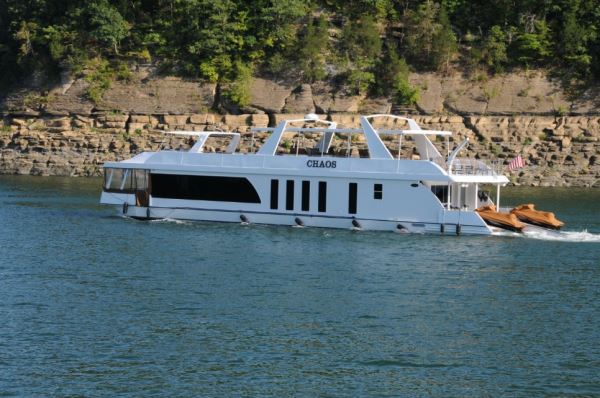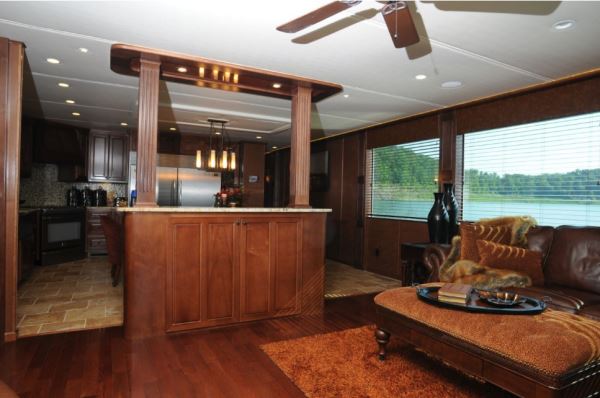
Since the recession in 2008, most marine lenders nationwide have made it quite difficult for consumers to finance a houseboat and our industry has suffered because of this. In order to get financing for their next dream houseboat, buyers often have to have excellent credit, be willing to put down at least 20 percent, and meet a liquidity requirement that requires them to have the down payment plus one year of debt servicing (monthly payment for debts on your credit report) in the bank at the time of applying for the loan. That can be a lot to ask when most people were used to just needing 20 percent down before the recession.
 It’s always been a lot easier for consumers to get financing for an RV or powerboat, which can be extremely frustrating to the potential houseboat buyer. According to Broadmoor RV, in some cases lenders don’t even require a down payment but just some type of a trade-in. The reason for the unfair advantage toward the houseboating industry is the simple fact that RVs and powerboats are production models and not custom-built boats. Banks can look up the value of a powerboat, but with no book value on a custom houseboat, all the bank has to go off of is comparables, which is why they require larger down payments from even those buyers who are on more stable financial ground. It can be hard for banks to know the exact value of a custom-built boat, so the risk can be higher for them when compared to an RV loan. Another issue making it tougher is that before the recession, there were more banks in the houseboat lending business compared to today where there are just a few.
It’s always been a lot easier for consumers to get financing for an RV or powerboat, which can be extremely frustrating to the potential houseboat buyer. According to Broadmoor RV, in some cases lenders don’t even require a down payment but just some type of a trade-in. The reason for the unfair advantage toward the houseboating industry is the simple fact that RVs and powerboats are production models and not custom-built boats. Banks can look up the value of a powerboat, but with no book value on a custom houseboat, all the bank has to go off of is comparables, which is why they require larger down payments from even those buyers who are on more stable financial ground. It can be hard for banks to know the exact value of a custom-built boat, so the risk can be higher for them when compared to an RV loan. Another issue making it tougher is that before the recession, there were more banks in the houseboat lending business compared to today where there are just a few.
At this rate, the houseboat industry as a whole could be looking at a rocky future with this liquidity requirement, but before you jump ship on your dream of houseboat ownership, there is finally some good news for the houseboating industry.
 Two years ago Newcoast Financial Services began working with a new credit union on financing powerboats and yachts, but at the time the lender didn’t offer houseboat loans. Earlier this year that all changed. As an exclusive to Newcoast, the credit union doesn’t have a liquidity requirement for houseboat loans and this is now making it possible for consumers to once again buy both new and used houseboats just as easily as those buying powerboats.
Two years ago Newcoast Financial Services began working with a new credit union on financing powerboats and yachts, but at the time the lender didn’t offer houseboat loans. Earlier this year that all changed. As an exclusive to Newcoast, the credit union doesn’t have a liquidity requirement for houseboat loans and this is now making it possible for consumers to once again buy both new and used houseboats just as easily as those buying powerboats.
“They’re more flexible on credit so if you struggled during the recession, but have since re-established your credit, you can still get a loan,” says Joey Gottfried from Newcoast Financial Services. “Houseboat lending has changed and while 20 percent down is still standard, this credit union will consider as low as 15 percent in certain situations. Same goes for the max age requirement that used to be 10 years on houseboats, but now the max age for a houseboat loan is 20 years and possibly even back as far as boats built in 1991 on an exception basis.”
If it sounds like Gottfried is excited about this gold mine of a funding source you’d be correct. After hearing the great news he began to call everyone in the industry.
“I was at a boat show in Sarasota when I first heard the news,” recalls Gottfried. “After a brief celebration I immediately started calling every houseboat broker in my phone to share it with the entire industry. This is a victory for everyone.”
Will other banks follow the lead? It’s hard to say and even harder to predict. It is possible that other banks with money to lend could decide to follow the lead of this credit union, but for some lenders who were burned you can’t blame them for being a little shy. Either way, for now there is hope for those in search of houseboat financing and this is that great news we’ve all been waiting to hear for years.